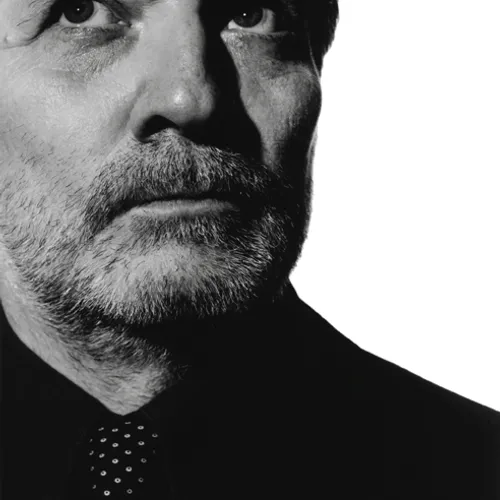
(Székelyudvarhely / Transylvania, 1944)
Peter Eötvös,was born on January 2, 1944 at Székelyudvarhely (Transylvania),he was admitted to the Academy of Music at Budapest at the age of 14 on the advice of Zoltán Kodály. In 1966, he received an academic grant and went to Cologne to study management at the Hochschule für Musik. Between 1968 and 1976, he played regularly with the Stockhausen Ensemble, and from 1971 to 1979, worked in collaboration with the electronic studio of the WDR in Cologne. In 1978, at the invitation of Pierre Boulez, he conducted the inaugural concert of IRCAM in Paris, before being appointed head of the Ensemble Intercontemporain, a position he held until 1991.
In 1980, Eötvös made his debut at the Proms in London. He is the Principal Guest Conductor of the Symphony Orchestra of the SWR Stuttgart Radio Orchestra, BBC Symphony (1985-1988), the Budapest Festival Orchestra (1992-1995) and Orchestra Budapest Philharmonic (since 1998), and also holds the position of Principal Conductor of the Chamber Orchestra of Radio Hilversum (1994). In 1991, he founded the International Institute Peter Eötvös for young conductors and composers. From 1992 to 1998 he was professor at the Conservatory in Karlsruhe, and at the Cologne Conservatory until 2001. He has been teaching at the Conservatory in Karlsruhe since 2002.
Eötvös has received many awards and numerous international prizes including the Prix Bartok (Hungary, 1997), Christoph and Stephan Kaske Prize (Germany, 2000), the Kossuth Prize (Hungary, 2002), the Royal Philharmonic Society Music Award in 2002 and the SACD Prix The winner in the catergory in the "Music Prize" in 2002. Eötvös has been a member of the Academy of Arts in Berlin since 2000, the Art Academy in Budapest Szechenyi and the Academy of Arts of Saxony in Dresden. In addition, the French Minister of Culture made him Officer of the Order of Arts and Letters in 1998 and Commander of the Order of Arts and Letters in 2003, and MIDEM awarded him the Cannes Classical Award for "Best Living Composer" in 2004. In 2007 he was awarded the Music Prize of Frankfurt.
Recent compositions by Peter Eötvös have won major international success. His works are performed by the most prestigious ensembles, including "zeropoint" created by the London Symphony Orchestra in 1999, "IMA" created by the WDR Symphony Orchestra Cologne in 2002 and "Jet Stream" performed for the first time by the BBC Symphony Orchestra in London in 2003. Eötvös is working with major symphony orchestras of European radio stations and internationally with the Royal Concertgebouw Orchestra, Berlin Philharmonic, the Philharmonia Orchestra, the Los Angeles Philharmonic Orchestra and the New Japan Philharmonic.
In recent years, Eötvös has become more productive in the field of musical theater. His second grand opera "Le Balcon" by Jean Genet's play, commissioned by the Festival d'Aix-en-Provence in collaboration with the Théâtre du Capitole in Toulouse, is created with great success by the Ensemble Intercontemporain in July 2002 as part of the Festival d'Aix-en-Provence. Another great success is celebrated by Peter Eötvös's opera Angels in America based on the play of the same name created by Tony Kushner at the Theatre du Chatelet in Paris in November 2004. The creation is followed by performances in Hamburg in 2005, in Boston and Amsterdam in 2006, in Berlin in 2007, in Fort Worth / Texas in 2008 and the Frankfurt Opera in 2009.
Among the latest works by Eötvös is the violin concerto "Seven", written as a memorial to the astronauts of the shuttle Columbia.
NOTICE
La catastrophe de la navette spatiale Columbia, le 1er février 2003, fut un événement dramatique qui m’a beaucoup affecté. En particulier, l’image diffusée à la TV, d’un casque d’astronaute vide et intact, faisant partie des débris trouvés au sol, a pour moi, symbolisé la tragédie de cet accident dans lequel sept personnes ont trouvé la mort, peu de temps avant le retour de la navette sur Terre.
Je réfléchissais depuis longtemps à l’écriture d’un concerto pour violon. A la lumière de cette tragédie de la 28ème Space Shuttle Mission, j’ai repris cette idée ; le concerto pour violon comme dialogue musical entre soliste et orchestre, me paraissait particulièrement approprié pour donner une forme musicale à la mémoire des astronautes tués.
Chacun des sept astronautes a reçu sa cadence dédicatoire personnelle. La composition même reflète la représentation de leurs personnalités, par exemple par de réminiscences des cultures musicales de Kalpana Chawla, l’astronaute américaine née en Inde, et d’Ilan Raman, le premier israélien dans l’univers.
Le nombre 7 définit la structure musicale et rythmique de l’œuvre et décrit en même temps le principe fondamental de la composition : 49 musiciens sont divisés en 7 groupes. Outre le violon soliste, il y a 6 autres violons qui se dispersent dans la salle ; semblables à sept satellites ou âmes sonnant et planant dans l’espace.
Le concerto pour violon, Seven, est un monologue très personnel et l’expression musicale de ma compassion pour les sept astronautes qui ont laissé leur vie pour l’exploration de l’univers et pour la concrétisation d’un rêve humain.
L'œuvre est représentée pour la première fois en septembre 2007 au Festival de Lucerne par la violoniste Akiko Suwanai et l'Orchestre du Festival de Lucerne sous la direction de Pierre Boulez. En août 2008, le nouvel opéra d'Eötvös « Love and Other Demons » d'après Gabriel García Marquez est créé au Festival de Glyndebourne.